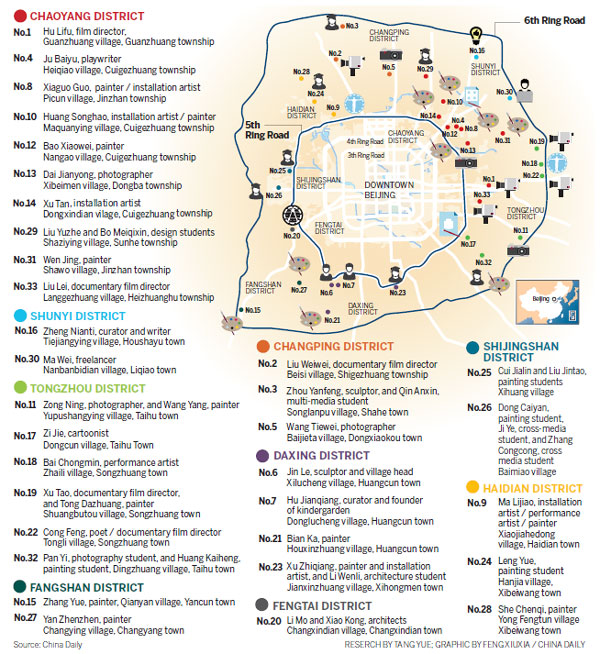|
|
Fight commercialization
Zhao Liang, a respected documentary filmmaker who was unable to participate in the project, was also critical of the contemporary art scene. "I don't think these artists are unaware of what's happening in society, and how hard the lives of migrant workers can be, but they have made conscious decisions to dodge reality. Some of them just enjoy wearing luxury brands and driving expensive cars," he said.
Paolo Magatnoli, a lecturer in contemporary arts at the University of Queensland in Brisbane, Australia, said the commercialization of art is a global phenomenon, but Chinese artists appear less interested in the real world.
According to the Italian national, who has lived and worked in Milan, New York, London and Sydney, Beijing's 798 Art Zone "is very commercialized, and very Westernized. The type of art there tends to be very international, but barely concerned with social issues."
Ge Lei said "Between the Fifth and Sixth Ring Roads" aims to bring artists closer to society. However, most of the participants are independent artists who work in the less-commercial spheres, and art students. "That's not surprising. We are not in the mainstream art circle, so it's natural that our project mainly appeals to birds of the same feather."
The four initiators - Ge Fei, Ge Lei, Li Yifan and Man Yu - have funded the project themselves. So far, they have spent less than 30,000 yuan ($4,800), mainly to cover the travel expenses of participants from outside Beijing, and their daily living costs.
The project has presented the artists with a series of challenges. Spending time with the migrant workers involved befriending and conversing with total strangers, and life in the villages can be hard, especially in winter when the lack of private bathrooms and efficient heating systems can drain enthusiasm and resolve.
"The biggest challenge is building up trust with the people you want to approach," Zhou Yanfeng, a participating sculptor, said. Inevitably, the young artists also encountered controversial aspects of village life, such as illegal (unregistered) kindergartens and the lowest levels of the sex industry. Other dangers lurked too. Documentary filmmaker Liu Weiwei claims he was physically assaulted by an official in Beisi village in Changping after he asked questions about local living conditions.
Li Renqing, a rural development scholar at the Chinese Academy of Social Sciences, said the project has great validity in reporting on the lives of migrant workers.
Li Yifan, who is an associate professor of oil painting at the Sichuan Institute of Fine Arts, said the project will help people who live in the better areas of Beijing to learn about life outside the fifth ring road.
However, as the French economist Thomas Piketty, author of Capital in the Twenty-First Century, pointed out, the inequality gap is hard to close.
At a seminar held by the organizers with some villagers in late March, Fan Yusu, a 41-year-old housekeeper, spoke up: "I've heard people mention equality quite a few times today. I dearly harbor the wish that the day will come when an artist talks to a migrant worker and doesn't adopt a superior approach, and the migrant worker won't feel inferior. I hope that all of you, and your work, can help to bring that day a little closer."
|
Beisi village photographed at 9 am and 9 pm on the same day. Wang Pan / for China Daily |

Contact the writer at [email protected]
